Passenger Liners to Gas Tankers
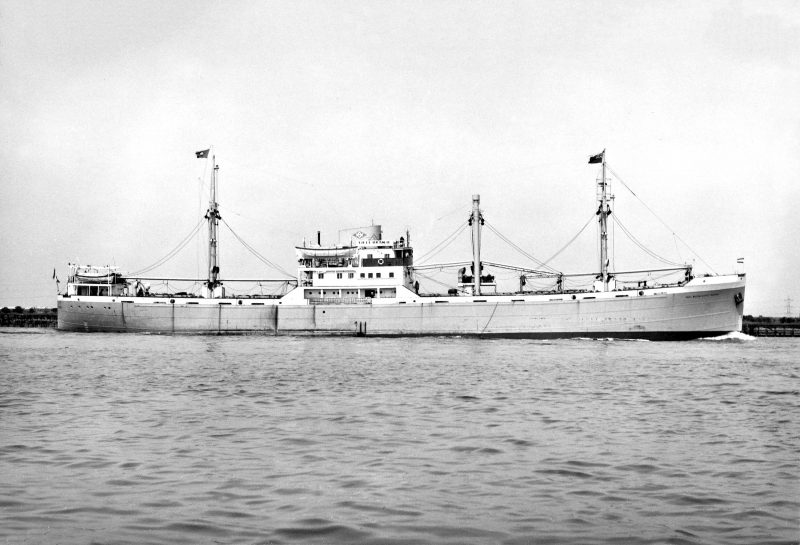
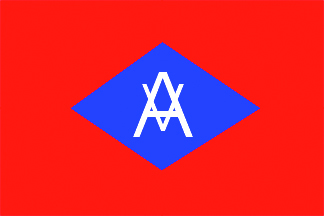
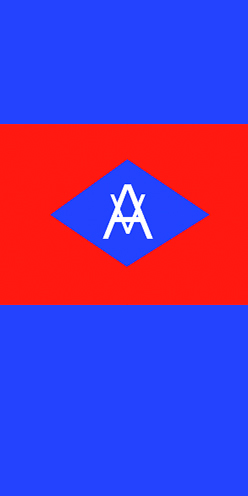 Anthony Veder was born in Rotterdam on 7th October 1914 as the son of a merchant and pioneer radio broadcaster in the 1920s of the same name and Maria Johanna van Hoboken. The large extended Veder family included Willem Veder, who lived to the good age of ninety years after managing the partnership of Hudig and Veder, formed in Rotterdam and steamship owners since 1888, with a Holland to East Africa Line and its coastal trading company of the Holland Ireland Line. A fleet of a dozen cargo ships of up to 7,000 dwt was being traded by Hudig and Veder in the inter-war years, all with names ending in ‘o’. Anthony Veder junior spent several years as a trainee in the shipping and banking businesses in Switzerland and in Rotterdam, before branching out into his own shipping business, Maats Zeetransport & Company N.V., with substantial family investment on 16th July 1937. This company intended to trade from Rotterdam to the St. Lawrence and Great Lakes ports under the name of Oranje Line.
Anthony Veder was born in Rotterdam on 7th October 1914 as the son of a merchant and pioneer radio broadcaster in the 1920s of the same name and Maria Johanna van Hoboken. The large extended Veder family included Willem Veder, who lived to the good age of ninety years after managing the partnership of Hudig and Veder, formed in Rotterdam and steamship owners since 1888, with a Holland to East Africa Line and its coastal trading company of the Holland Ireland Line. A fleet of a dozen cargo ships of up to 7,000 dwt was being traded by Hudig and Veder in the inter-war years, all with names ending in ‘o’. Anthony Veder junior spent several years as a trainee in the shipping and banking businesses in Switzerland and in Rotterdam, before branching out into his own shipping business, Maats Zeetransport & Company N.V., with substantial family investment on 16th July 1937. This company intended to trade from Rotterdam to the St. Lawrence and Great Lakes ports under the name of Oranje Line.
Oranje Line
Two Great Lakes traders were purchased from the competing Fjell Line of Olsen & Ugelstad of Oslo as Taborfjell and Harpefjell of 1,288 grt and renamed Prins Frederik Hendrik and Prins Maurits. This pair had been built in 1936 and was purchased in November 1937 by Anthony Veder N.V. of Rotterdam. They were four hold steamers powered by Bauer Wach compound steam engines boosted by a low pressure exhaust turbine. The Great Lakes service was popular with calls at many Norwegian, British, German, Dutch, Belgian and French ports before crossing the Atlantic to ports on the estuary of the St. Lawrence as well as Quebec, Montreal and ports on the Great Lakes accessed by the restricted size locks on the Welland Canal between Lake Ontario and Lake Erie.
The funnel colours of the Anthony Veder pair were yellow with a central blue diamond bearing a stylised ‘AV’ logo on an orange band, while the competing Fjell Line funnel colours ships were yellow with a central black band having the ‘OU’ monogram intersecting two narrow white bands, the hulls being grey with red boot topping. Freight only was carried at first, and passengers and freight from 1946 onwards, with Prins Maurits arriving in Chicago for the first time on 5th June 1938. The names of Dutch royalty were used for all of the Oranje Line passenger and cargo ships. Three more small ships, but powered by diesel engines, were completed in 1938/39 as Prins Willem van Oranje, Prins Willem II, and Prins Willem III with grey hulls for trading from European ports to the Canadian Great Lakes. This fleet of five ships was managed by Anthony Veder N. V. from an office in the Parklaan in Rotterdam.
World War II and Rebuilding
The five Veder Great Lakes traders were all able to be requisitioned by the British Ministry of Shipping and the Ministry of War Transport (MOWT) as they were fortunately out of Dutch ports when the Germans ‘blitzkreiged’ Rotterdam by dive bombers in April 1940. The small coaster Remark 396/1936 built by E.J. Smit & Zoon at Westerbroek and powered by a six cylinder Humboldt diesel engine also made it across the North Sea to fight the Germans on the Allied side under Anthony Veder management. Three of the five Great Lakes traders were to be lost to enemy action:-
- Prins Frederik Hendrik bombed and set on fire by German aircraft on 8th March 1941 and sank in the North Atlantic with eight crew lost and sixteen survivors.
- Prins Willem II torpedoed and sunk by U98 in the North Atlantic on 8th April 1941 with 22 survivors and 12 crew lost when a straggler behind convoy HX117.
- Prins Willem III torpedoed by German aircraft on 26th March 1943 and taken in tow by the Admiralty tug Hengist, but capsized and sank in position 37-02 North, 14-0 East between Malta and Sicily, eleven crew lost.
Five ships were managed for the Dutch Government in the immediate aftermath of World War II, including a ‘Liberty’ type that was later purchased in 1950 and renamed Prins Willem II and traded to the Great Lakes for three years before her sale to the Claymore Shipping Co. Ltd. of Cardiff and her renaming as Dayrose. A smaller vessel of 2,065 grt had been built for Norddeutscher Lloyd in 1929, and after three years of management by Veder was purchased in 1949 and renamed Prins Philips Willem and traded for three years before her sale to Belgian owners.
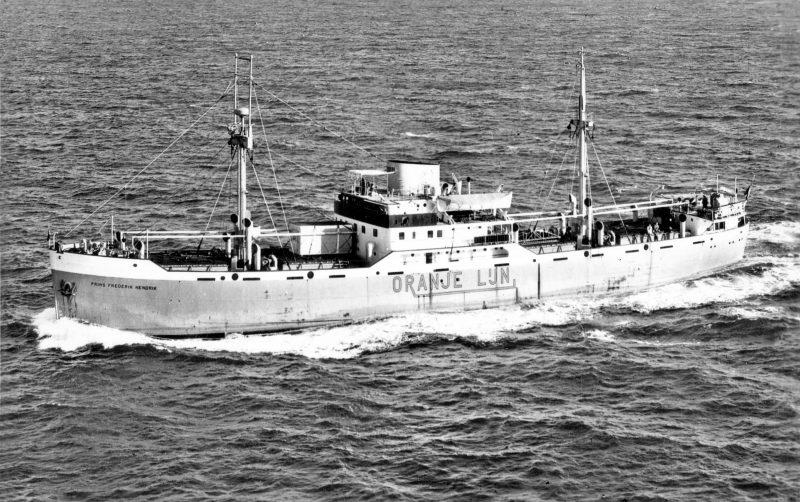
The surviving pair of Prins Willem van Oranje and Prins Maurits were rebuilt and reconditioned in 1946 for peace time trading by Oranje-Fjell Line. Also in 1946, Maats Zeetransport & Company N.V. changed its name officially to Oranje Line. Two replacement motorships with accommodation for ten passengers were completed in 1947 by the De Merwede yard at Hardinxveld as Prins Alexander and Prins Johan Willem Friso of 3,986 dwt. As such, this pair was too large to use the Welland Canal to reach the Great Lakes and Chicago, and thus it was April 1959 when they were first able to transit the new St. Lawrence Seaway to reach the Upper Lakes. However, seven smaller Great Lakes traders of 2,650 dwt were built during the decade from 1946 to 1956 by the De Merwede and Amsterdam Dry Docks yards, and were able to reach the Great Lakes in Prins Casimir, Prins Frederik Hendrik, Prins Frederik Willem, Prins Willem II, Prins Willem III, Prins Willem V, and Prins Willem van Oranje. They each carried ten passengers, with their Stork and Werkspoor diesel engines giving a service speed of thirteen knots. The Oranje Line fleet had been rebuilt into a medium sized fleet of fourteen passenger and cargo ships by 1959.
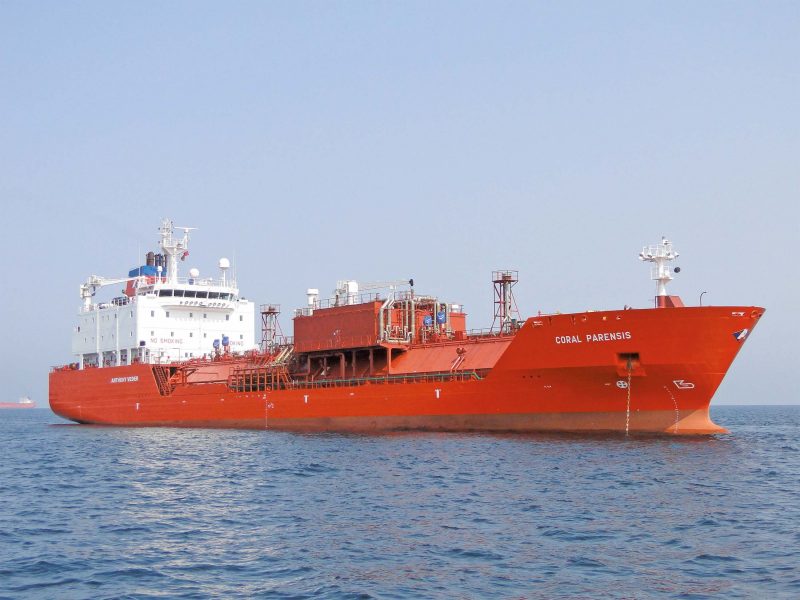
A Trio Of Passenger Cargo-Liners
In 1958, KPM (Koninklijke Pakket Maats) purchased all of the shares of Oranje Line, with Holland America Line (HAL) purchasing 50% of KPM a year later, but with Anthony Veder remaining as a director of Oranje Line. Participation in Oranje-Fjell Line was terminated in 1959, and after a serious illness in 1964 Anthony Veder withdrew from the management and became President-in-Office of Oranje Line. A trio of handsome passenger cargo-liners had by that time been built for Oranje Line in Prins Willem van Oranje of 7,328 grt in 1953 from the Boele’s Scheeps and Masch yard at Bolnes, and the near sisters Prinses Irene of 8,533 grt in 1959 from the De Merwede yard at Hardinxveld, and Prinses Margriet of 9,336 grt in 1961 from the same De Merwede yard.
PRINS WILLEM van ORANJE of 7,544 dwt was the first of this trio and had accommodation for sixty First Class passengers, and the two larger later near sisters had accommodation for 111 First Class passengers. Thus, 282 passenger berths had been added to the already overcrowded Atlantic liner berths, with the first airliners also taking trade away from all of the many Transatlantic liner companies from 1959 onwards. Prins Willem van Oranje had an unusual ‘bulbous’ funnel perched almost on top of her chartroom and navigating bridge, and two masts and two sets of posts to carry her cargo handling gear to work her five holds on the weekly Transatlantic service from Rotterdam. She had a good service speed of 18.5 knots from her Werkspoor diesel engines, and was a regular caller at Port Huron (Michigan) after the opening of the St. Lawrence Seaway in April 1959.
PRINSES IRENE had a fo’c’stle that was not included in the design of the hull of her near sister, Prinses Margriet. She was launched on 12th July 1958 as Yard number 546 on dimensions of length 455.9 feet, moulded beam of 61.3 feet and draft of 28.3 feet. She had a service speed of seventeen knots from a ten cylinder M.A.N. diesel engine manufactured by Verolme Masch at Ijsselmonde, and was equipped with a stern anchor and two bow anchors. She was opened to the public in the summer of 1960 during the Chicago International Trade Fair, her mesh topped funnel setting her apart from other Great Lakes traders. On her Caribbean winter schedule, she sailed from Rotterdam with a call at Southampton or Plymouth for Vera Cruz and Tampa.
PRINSES MARGRIET was a well designed and good looking liner on her late Autumn and Winter schedules to the warm Caribbean ports as well as her Spring and Summer sailings to the St. Lawrence, and will be described in some detail. The construction cost was $6 million with her keel laid in March 1960 on the same hull dimensions as her near sister Prinses Irene, but she had a longer superstructure with five decks named Sun Deck, Boat Deck, Promenade Deck, Upper Deck and Main Deck. The height from her keel to her spacious open Sun Deck was 69 feet, with Boat Deck having her Master’s, Chief Engineer’s and Navigating Officer’s accommodation with plenty of open deck space below her four lifeboats.
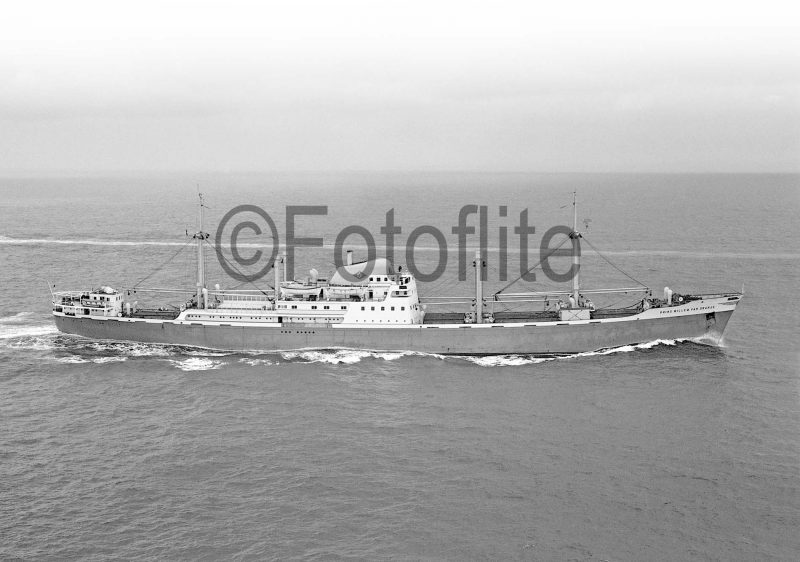
The promenade Deck had a large spacious forward facing wraparound Main Lounge with a circular dance floor on the starboard side, and the elegant Dining Room for 62 passengers seated on pink upholstered carver chairs on the port side just forward of the galley and pantry, and the Writing Room and Library on the starboard side. A glass enclosed promenade and verandah on the starboard side led aft to a cosy and popular bar with eight bar stools and several tables for parties of four as well as comfortable sofas and cane deck chairs. Upper Deck had 33 staterooms as well as the Purser’s Office, a Gift Shop, Medical Room and the Hairdressers, with a two bed hospital located aft. Main Deck had the remaining 24 staterooms with the passenger Baggage Room aft that was unlocked at advertised times during the day. A heavy lift derrick on her foremast, and ten other derricks on her fore and main masts and a set of posts ensured good cargo working ability.
However, the trio of passenger cargo-liners became unprofitable on their heavily overcrowded and competitive trade, with Prins Willem van Oranje of 1953 sold off in 1965 to Deutsche Seereederei of East Germany and renamed Ferdinand Freiligrath, Prinses Irene chartered to Cunard Line in 1964 and sold off later that year to the Indonesian Government and rebuilt into the pilgrim passenger vessel Tjut Njak Dhien, and Prinses Margriet sold in 1964 to Holland America Line without change of name.
Five larger cargo ships with accommodation for a dozen passengers entered the Oranje Line fleet in the 1960s, the first being Prins Maurits of 5,675 dwt, completed for Veder in 1961 by the P. Lindenau yard at Kiel and traded for eight years before her sale to Greek owners. The second was Prins Philips Willem of 8,375 dwt that was built in 1950 as Havfalk for A/S Meyers of Oslo and then sold to Olsen & Ugelstad in 1964 and renamed Rugdefjell before her purchase by Veder in 1966. Prins Philips Willem was traded for three years before her sale to Greek owners in 1969. A trio of KPM cargo-liners of 4,840 dwt that had been completed in 1954 for KPM as Schouten, Roggeveen and Van Waerwijck were transferred from the Royal Java China Packet Line (KJCPL) to Oranje Line in 1967 and renamed Prinses Anna, Prinses Emilia and Prinses Maria respectively but were sold off in 1969. Financial problems then dogged Oranje Line and the services to the St. Lawrence were halted in late 1969 with the company liquidated on 1st January 1970.
Entry Into The Gas Tanker Trades
Anthony Veder died in Rotterdam on 30th August 1967 of heart failure aged only 52 years after suffering years of heart disease problems. He and a small number of staff had set up the Anthony Veder Group in Curacao in 1958, with a new company established in 1961 in Curacao as Koraal Scheepvaart Maats N.V. in a smart office building in Willemstad, the capital of the island, called the Anthony Veder Building. Curacao is only 38 miles in length and just over seven miles wide and consists of hilly, scrubby country with cactus and acacia plants predominating. Willemstad and its famous Queen Emma floating pontoon bridge is at the southern end of the island, with the pontoon bridge opening to allow tankers and other ships to access the Shell refinery in an inland lagoon. Curacao has been Dutch territory since 1634, and together with the two neighbouring islands of Aruba and Bonaire have fully internal self government as part of the Kingdom of the Netherlands, with reciprocal tax arrangements.
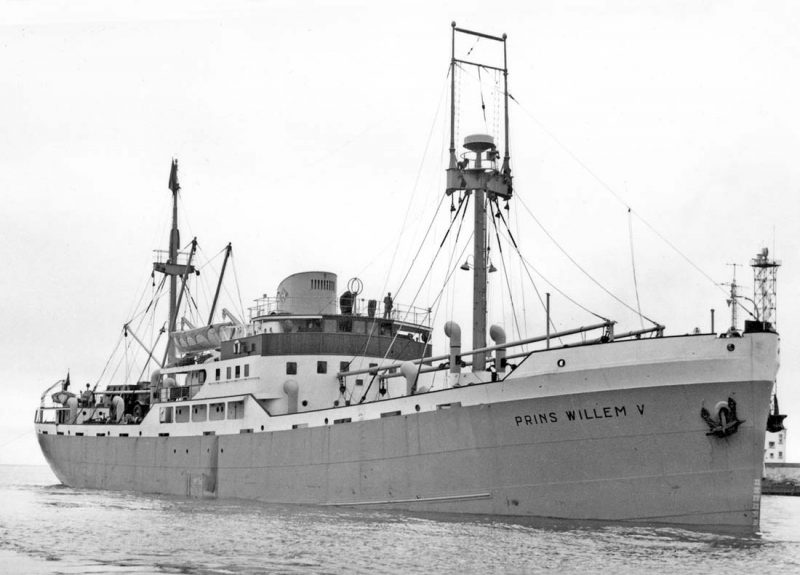
Koraal Scheepvaart Maats N.V. was managing general cargo operations from Holland to the Mediterranean and West Africa, and in reefer ships for overseas fruit transport from the Caribbean, and in port operations throughout the Netherlands Antilles. A dozen or more coasters and general cargo ships were managed and traded between 1961 and 1980 as Arbon, Aruba Bay, Bernhardina, Boca Tabla, Bonaire Bay, Caracas Bay, Celtic Prince, Coral Acropora, Coral Actinia, Martina, Trivia, Ulla, Verna, and Wilhelmina. Coral Acropora and Coral Actinia were three hold, three hatch, engines aft open shelterdeck coasters of 1,589 dwt built at Le Havre in 1962/63 and equipped with six derricks of three ton capacity. A trio of larger reefers of 6,985 dwt was later completed in 1987/90 as Prins Casimir, Prins Willem van Oranje and Prins Frederik Willem for deep sea fruit transport to Europe.
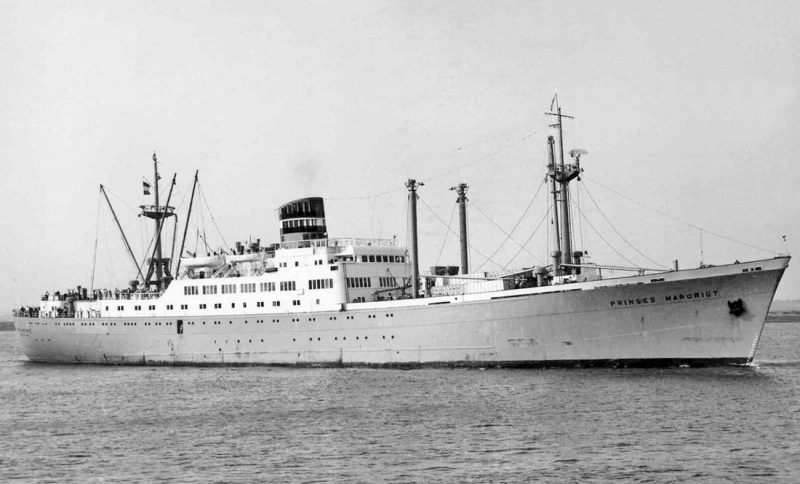
The first new Veder gas tanker was commissioned in 1968 as Coral Maendra of 4,550m3 tank capacity (4,207 dwt) when completed by a Dutch yard at Zaltbommel. Coral Obelia of 3,000m3 tank capacity (3,094 dwt) was purchased in 1971 as Arctic Propane and had been built at Moss in Norway in 1966, and was followed by Coral Rubrum in 1974 from a yard at Dordrecht with 5,863m3 tank capacity (6,844 dwt). In 1976, a larger new gas tanker Coral Isis with three tanks of total capacity of 5,536m3 (6,035 dwt) was delivered from the Jos. L. Meyer yard at Papenburg. Coral Isis had the sisters Deltagas and Epsilongas in the Sloman Neptun Gas fleet. All of these Veder gas tankers had a suffix denoting a type of coral.

The names of Dutch royalty began to be used again in 1981 for Anthony Veder gas tankers, with two new sisters completed by the N.V. Ijsselwerf yard at Capelle den Ijssel as Prins Maurits and Prins Frederik Hendrik of 3,604 dwt and powered by six cylinder Klockner Humboldt Deutz diesels to give service speeds of 13.5 knots. Three similar but smaller gas tankers came from the same yard in 1985 as Prins Alexander, Prins Philips Willem and Prins Willem II of 1,650 dwt with tank capacity of 1,633m3. A twin gas tank vessel was completed in 1989 at Stroobos in Holland as Prins Johan Willem Friso of 4,202 cubic metre capacity (4,905 dwt) powered by a six cylinder Sulzer diesel engine giving a service speed of 14.5 knots.
A dozen gas tankers was being operated in 1999 by Anthony Veder Tankvaart Maats B.V. and Anthony Veder Scheepvaart Maats B.V. in Coral Acropora, Coral Actinia, Coral Antillarum, Coral Carbonic, Coral Isis, Coral Meandra, Coral Millepora, Coral Obelia, Prins Johan Willem Friso, Prins Alexander, Prins Philips Willem and Prins Willem II. They were of up to 6,000 dwt (tank capacity 5,500m3) and had been completed between 1985 and 1999. Coral Isis of 6,078 cubic metre capacity in four tanks had been purchased in 1997 as Jean Alleaume, and had been completed with this name in 1982 by Chantiers Nav. de la Ciotat at La Ciotat in Southern France for Geogas Enterprises S.A., Geneva. The fleet was engaged on the following worldwide voyages in November 2000:-
- Coral Acropora – Nassau to Trinidad
- Coral Actinia – Zeebrugge to Rotterdam
- Coral Antillarum – Cork to Belfast
- Coral Carbonic – Malmo to Hamburg
- Coral Isis – Brindisi to Venezuela
- Coral Meandra – Barcelona to the Tees
- Coral Millepora – Terneuzen to Hamina
- Coral Obelia – Tees to Porgrunn
- Coral Palmata – Antwerp to Brindisi
- Coral Pavona – Singapore to Port de Bouc (France)
- Coral Rigida – Chiba to the Philippines
- Coral Rubrum – Map Ta Phut to Indonesia
- Prins Alexander – Singapore to India
- Prins Johan Willem Friso – Hamburg to the Tees
- Prins Philips Willem – Jakarta to Singapore
- Prins Willem II – Singapore to India
The Anthony Veder companies ordered three gas tankers from the De Poli family yard in Italy in 2004, and they were completed as Coral Lophelia, Coral Leaf and Coral Nettuno. The size of the fleet continued to increase to 25 fully or partially owned gas tankers by 2013, with two more under construction that were named in 2014 as the LNG powered Coral Star and Coral Sticho. Those in service were Coral Acropora, Coral Actinia, Coral Alicia, Coral Anthelia, Coral Carbonic, Coral Electra, Coral Energy, Coral Favia, Coral Ivory, Coral Leaf, Coral Lophelia, Coral Lacera, Coral Maya, Coral Maendra, Coral Methane, Coral Millepora, Coral Obelia, Coral Palmata (ex Tarquin Rover), Coral Parensis, Coral Pavona (ex Tarquin Navigator), Coral Rigida, Coral Rubrum, Prins Hendrik, Prins Maurits and Prins Alexander. The last named trio were larger gas tankers of 18,700m3 and 28,195m3 capacity and had been recently purchased from the Bergesen Worldwide Gas (BW Gas) fleets. Coral Acropora, Coral Actinia and Coral Alicia were a 6,500m3 trio completed in 2012, and Coral Anthelia was a 6,500m3 LNG and LPG gas tanker completed in 2013. Coral Parensis was purchased in November 2010 from Teekay LNG Partners as Dania Spirit, having been completed in 2000 as Navion Dania for Navion of Norway.
Veder Speciality Gas Tankers
Coral Carbonic of 1,786 dwt (1,250m3 tank capacity) was specially built at Harlingen in 1999 to carry carbon dioxide in partnership with Royal Vopak, Gas Unie of Rotterdam, and Air Liquide of France for injection into empty oil and gas fields offshore. This joint venture was named Carbon in Transport (Cintra), and the vessel trades from Malmo, Hamburg and other North Sea ports to the offshore oilfields.
Coral Energy of 15,600m3 tank capacity is an LNG methane carrier that was completed in 2012 in Germany with an environmentally friendly dual fuel engine, and can use its own cargo as fuel. She is Ice Classed 1A for Baltic winter trading, and was named by Princess Maxima of Holland on 7th December 2012 in a special ceremony at Rotterdam. After the naming, Princess Maxima later toured the vessel accompanied by Jan Valkier (Anthony Veder CEO), Carel van den Driest (Anthony Veder director), Bernhard Meyer (Managing Partner of Meyer Werft Shipbuilders), and Bjorn Torkildsen (Skangass M.D. and charterer of the vessel). Princess Maxima later became Queen Maxima of Holland as the wife of King Willem Alexander on 30th April 2013. Skangas is a natural gas provider for Scandinavia, and Coral Energy loads LNG in Rotterdam, Zeebrugge and Norwegian ports and transports it to Stockholm, Gothenburg and other Swedish ports.
Coral Methane of 7,551m3 tank capacity was the first combined LNG, LPG and ethylene carrier in the world when completed in 2009 for a fifteen year charter to Gasnor of Norway. She has a dual engine room equipped with two diesel engines running on heavy fuel oil and two gas turbines, and can use its own cargo as fuel for the gas turbines. Gasnor produces and distributes LNG along the entire Norwegian coastline and remote areas for use by Hurtigruten ferries, oil rig supply vessels, and vehicles.
Coralius is a new 5,800m3 tank capacity LNG bunker and feeder gas tanker completed in 2017 with a blue hull by the Royal Bodewes shipyard. The vessel was named on 22nd May 2017 by Johanna Lamminen, Chair of the Board of Skangas and CEO of Gasum, Skangas being a subsidiary of Gasum. The vessel is equipped with a state of the art LNG transfer system and has a flat deck for safe working of side-by-side operations. Special winches have been installed to enable safe and swift mooring of the vessel, which allows clients to deliver gas to their terminals and also bunker their tankers at the same time. Coralius has dimensions of length 99.6 metres, moulded beam of 17.95 metres and loaded draft of 5.8 metres, and she has a service speed of 13.5 knots. She is owned jointly by a consortium of Sirius Rederi of Donso (Sweden) and the Anthony Veder Group and is on long term charter to Skangas, which also have long term charters on the LNG carriers Coral Energy and Coral Anthelia. She is expected to load LNG in Norway for ports in the Skagerrak, Kattegat and Baltic areas that have no access to piped LNG.
The main cargoes of the remainder of the fleet are propane and butane, as well as petro-chemical gas cargoes such as ethylene, ethane, propylene, butadiene, ammonia and vinyl chloride monomer (VCM). These LPG gas tankers are semi-pressurised and fully or semi-refrigerated and flexible in operation of cargoes carried, with the ethylene tankers having a high cooling capacity and are thus suitable for short voyages e.g. Rotterdam to the Tees. The gas tankers work on the ‘spot’ voyage market, on time charters, and on contracts of affreightment.
The vast majority of the fleet usually have red hulls, four exceptions being the Italian flag Coral Medusa (ex Castell dell’ Ovo) and Coral Monactis (ex Castello di Gradara) of 4,026m3 tank capacity, and Coral Pearl (ex Castel Nuovo) and Coral Patula (ex Castel Sant’ Elmo) of 8,000m3 tank capacity. They were purchased in 2015 from L.G.R. di Navigazione spA and have blue hulls and are home ported at Naples. The quartet previously operated in the Lauritzen Kosan Pool. There are also another ten gas tankers on charter to the company on short or long term charters in a big Anthony Veder fleet of around 35 ships that operate worldwide in the Far East, Europe, South America, Middle East and India. There are six LNG carriers in the fleet, as well as a fully pressurised LPG gas tanker, and a fully pressurised carbon dioxide carrier.
Teesside Lng Bunkering Berth
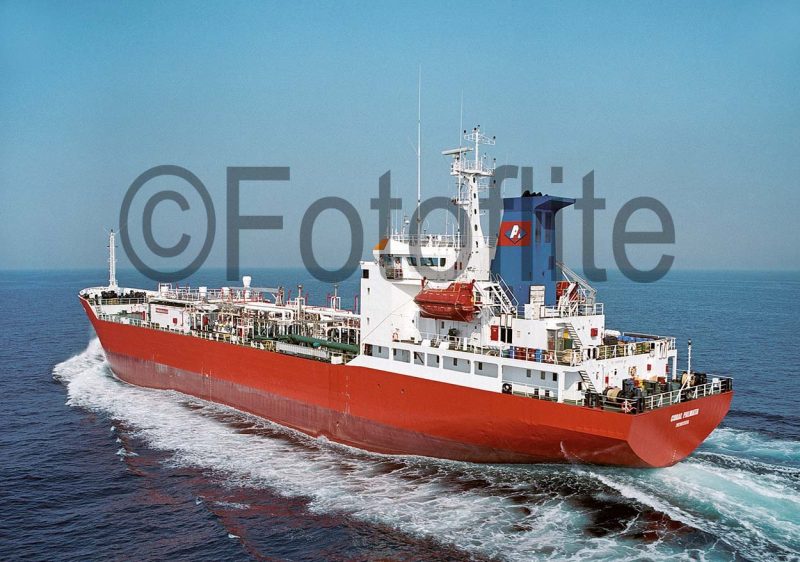
The Anthony Veder LNG fuelled ethylene gas tankers Coral Star and Coral Sticho are in regular employment transporting ethylene from the Wilton (Teesside) plant of chemical giant Sabic to ports at Rotterdam and in North West Europe and Scandinavia, the ethylene being used to make everyday products such as food packaging, PVC, detergents and adhesives. In early 2014, a consortium consisting of Sabic, Anthony Veder, and PD Ports launched a project ‘LNG Uptake in the U.K.’, which was a first ever trial of LNG bunkering in the U.K. at Teesport. In May 2015, Shell bunkered both Coral Star and Coral Sticho on one of their regular voyages from Teesside at a temporary bunkering berth, while Sabic was constructing their own LNG bunkering berth in association with PD Ports and commissioned at the end of 2015.
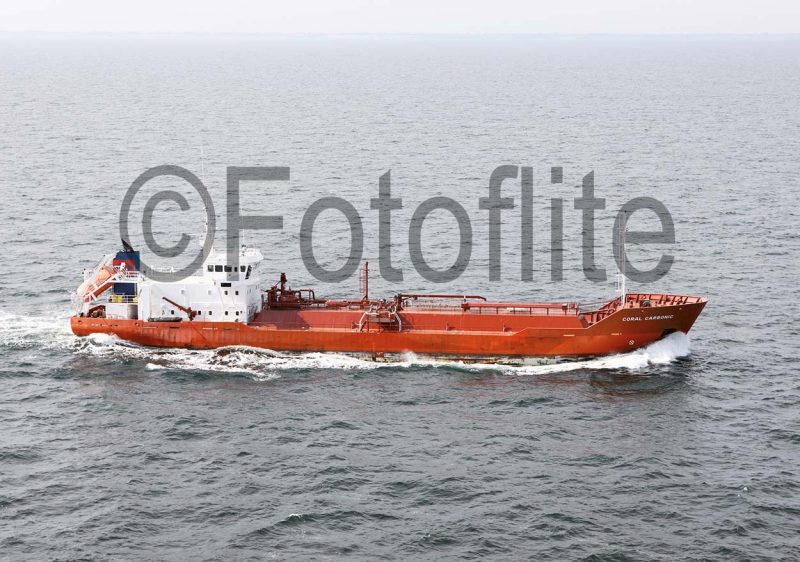
The Shell LNG Business Development Manager, Arjan Stavast, was proud of this first LNG U.K. bunkering berth, and it was completed due to close co-operation between Shell, Sabic, Anthony Veder, and contractors Schenk, Unitrove, PD Ports and Liqal. LNG is a clean fuel that is critical for meeting new EU sulphur emission regulations from ships, cutting out both sulphur oxide and nitrogen oxide emissions. The EU Continental countries have LNG bunkering berths at Zeebrugge and at Rotterdam, but the Teesport permanent LNG bunkering berth will enhance British exports in LNG fuelled gas tankers to Scandinavia and other parts of the world.
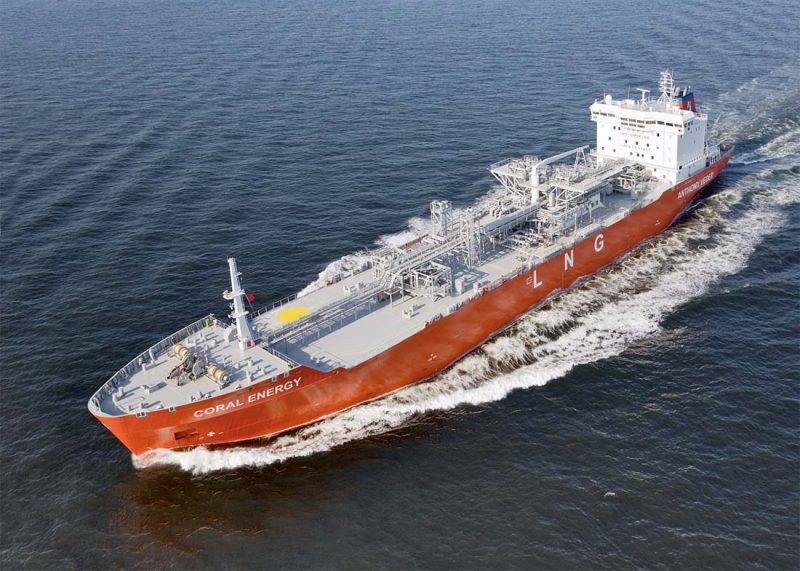
New Larger Lng Carrier
The 18,000m3 LNG tanker Coral Energice was delivered in early 2018 from the German yard of Neptun Werft, a subsidiary of the Meyer Neptun Group. She will be on a long term chartered to Skangas, a subsidiary of Gasum, which is committed to bringing LNG solutions to Scandinavian countries, and will transport LNG to two new LNG terminals under construction in Finland. The Tahkoluoto (Pori) and Roytta (Tornio) terminals are both partially icebound in winter in the northern arm of the Gulf of Bothnia, and thus the vessel is designed to Ice Class 1A Super to allow her to safely and reliably trade to the terminals in extreme winter weather.
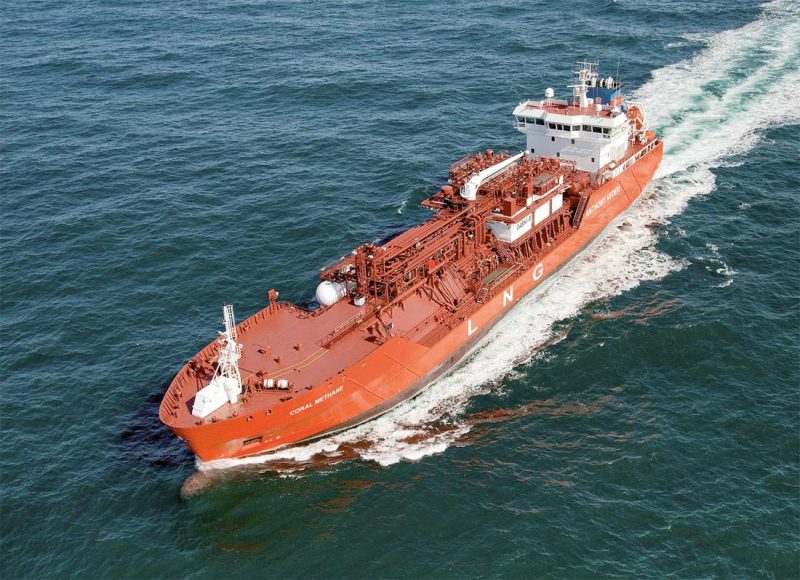
The design of the vessel is based on proven technology already successfully applied by Anthony Veder to its six existing LNG carriers. The important use of boil off gas as a fuel to power the vessel in its main and auxiliary engines means she is extremely versatile in operation and uses her own LNG cargo as fuel, and thus cuts down the number of regular LNG refuelling events in the ports of Teesside, Zeebrugge and Rotterdam. Small LNG bunkering berths are also being built at Risavika (Stavanger) to refuel Fjord Line LNG powered ferries, and at Tallinn.
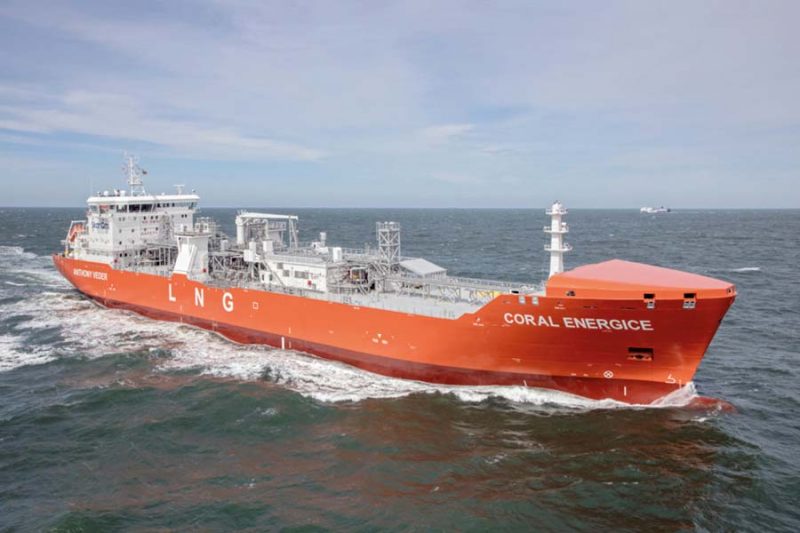
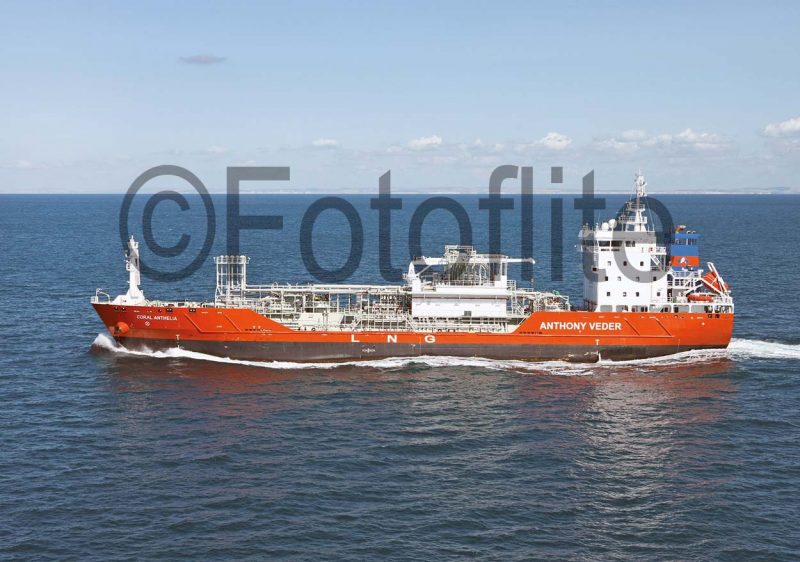
Postscript
The Anthony Veder companies have a long history in shipping of over eighty years, and today employ 900 onshore staff and seafarers. The Holland America Line (HAL) investments had reached a majority 64.2% holding in the Veder companies in 2011, with trading revenue of €113 million in that year but operating profit of only €7 million due to high fuel costs. Several of the Anthony Veder fleet serve in the Unigas International B.V. pool at any one time alongside gas tankers with ‘Happy’ prefixes or ‘Gas’ suffixes to their names. Those that do operate in Unigas have blue funnels with a blue ‘U’ on a broad central red band instead of the Veder funnel colours of blue with a broad central red band and a stylised ‘AV’ logo on a blue diamond.
Anthony Veder Travel was established in 1959 and specialises in transporting ships’ crews from the Philippines, Indonesia and the Ukraine to and from their vessels, and in business travel.
The LNG carrier Coral Anthelia of 6,500m3 tank capacity was being used in 2017 as a shuttle vessel to lift LNG cargoes from the 140,650m3 Golar Arctic built in 2005. The giant LNG vessel is serving as a Floating Storage Unit (FSU) in Montego Bay, Jamaica, with Coral Anthelia then brining the cargoes into port at Kingston on the Caribbean island on a long term charter. Coral Anthelia has her deck piled high with piping, tanks, and pressure and refrigeration equipment, and was retrofitted with a dual fuel system in 2015 that enabled her to run on boil-off gas when transporting LNG. This refit earned Anthony Veder N.V. a nomination for the 2015 Awards of the Royal Association of Dutch Shipowners (KVNR), but the award went instead to an innovative design of KOTUG hybrid rotor tugs.

However, the innovatory design of seven technically advanced Anthony Veder LNG carriers will surely mean an award from a major shipping or shipbuilding body will not be far off.
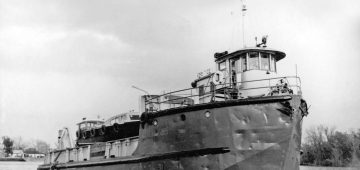
Comments
Sorry, comments are closed for this item